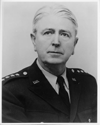The Victory Plan
Major Albert C Wedemeyer, a Junior officer, totally unknown to the general public and little known to the upper echelon of the military establishment was picked by General George C Marshall in the summer of 1941 for one of the most critical assignments of the Second World War. He was designated to chair a select committee with instructions to prepare a top-secret document, later to be known as the “Victory Plan.” President Roosevelt personally initiated the program with a threefold purpose: (i) make recommendations on how to rapidly mobilize American industry for war; (ii) make recommendations on how to build up American armed forces to the level necessary to fight our potential enemies, namely Germany and Japan; and (iii) most importantly, make specific strategic and tactical recommendations on how to defeat these powers in the event that America became involved in hostilities. Roosevelt anticipated America being involved in war within the near future and wanted to be ready, but because of the very strong isolationist sympathies so prevalent in theUnited Statesprior toPearl Harborany activities which even hinted at preparations for war would have had serious political ramifications.
Given the time constraints under which this committee was to prepare the Victory Plan, namely 90 days, it was a monumental task.
Copyright © 2007 - 2025. All Rights Reserved.
Original Coding by Goimage Media Services

